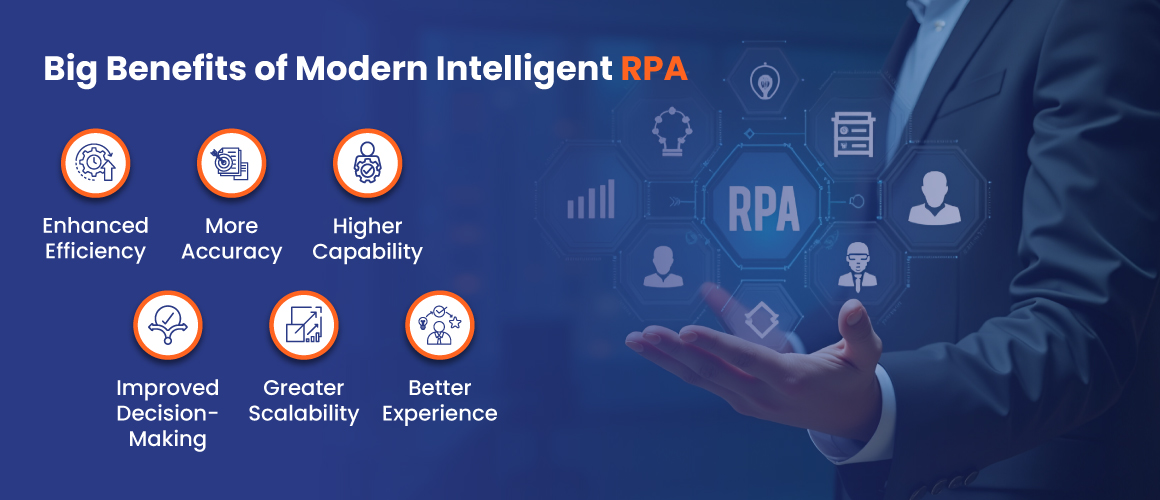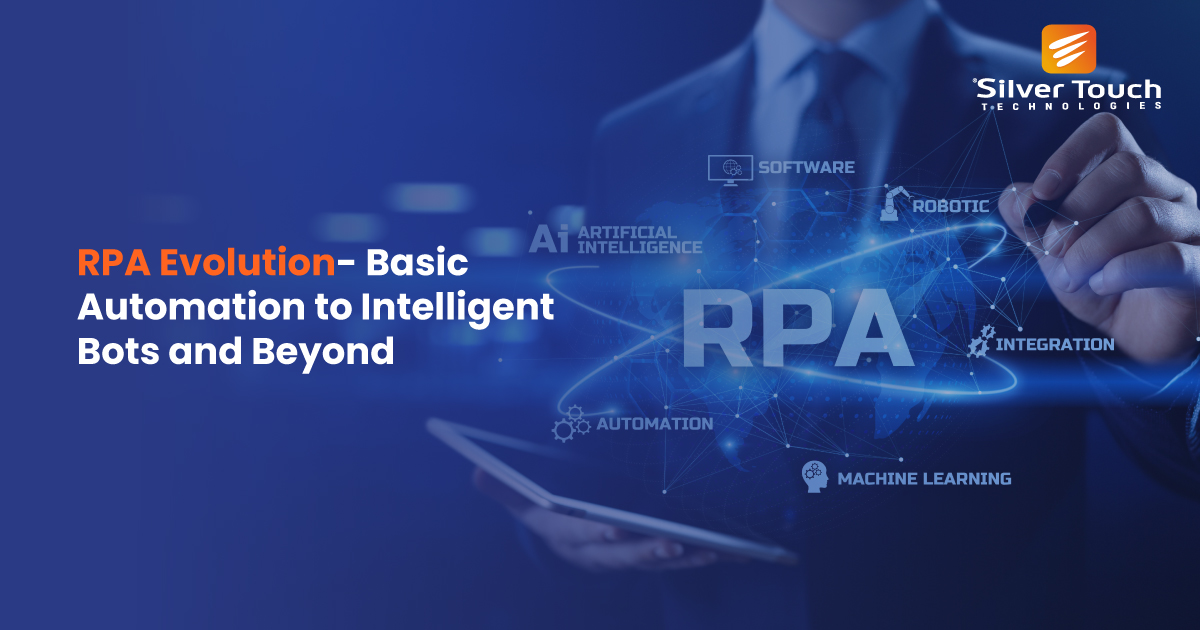Repetitive tasks require considerable time and effort from employees. It also reduces productivity as employees cannot focus on high-value and critical activities. Here, robotic process automation (RPA) technology provides a valuable aid to enterprises worldwide. RPA can automate rule-based repetitive tasks effectively, and companies can leverage its benefits with the help of RPA managed service providers.
As RPA technology evolves with other emerging technologies like AI and ML, modern enterprises get better RPA services. This post talks about the benefits of advanced and intelligent RPA. We will also dig deep into some challenges of using RPA as a service and see its prospects. Let’s start with the early days of RPA and what technologies drive its evolution.
Early Days of RPA Basic Task Automation
It all started in the early 1990s with concepts like screen scraping and UI testing. In the early days, RPA services were limited to basic task automation. Software robots mimic human interactions with computer interfaces to automate basic repetitive and rule-based tasks like data entry and form filling. These early RPA bots could increase efficiency and accuracy by eliminating human effort for mundane and high-volume tasks.
However, their scope was limited to a few sectors like banking and insurance. Early RPA bots did not require significant changes in existing IT systems and mostly remained useful for specific tasks. Gradually, emerging technologies like AI and ML are being combined with RPA bots to bring intelligence to handling complex tasks.
Key Technologies Powering the Evolution of RPA
Advancing technologies have enhanced the capabilities and scope of RPA solutions. Today, RPA managed services enable companies to leverage the advantage of intelligent bots based on technologies including
Artificial Intelligence and Machine Learning
These are the most beneficial technologies that have brought the concept of intelligent automation or cognitive RPA. On one hand, ML enables RPA bots to learn from data and identify patterns, and on the other hand, AI algorithms can enhance their ability to interpret information. Both these technologies assist bots in performing tasks like fraud detection that usually require human intelligence.
Natural Language Processing (NLP)
As a subset of AI, this concept enables computers to understand, interpret, and generate human language. NLP integration into RPA bots is useful for processing unstructured textual data from emails, documents, and even social media. It empowers intelligent chatbots to interact with customers and employees more naturally by generating human-like responses for their queries.
Computer Vision (CV) or OCR (Optical Character Recognition)
It enables RPA bots to read and extract text from images and PDFs. CV or OCR can convert the information into machine-readable data. Bots can ‘see’ and interpret visual information on screens with the help of computer vision. It makes them more capable of handling and interpreting data.
A reputed RPA services provider also utilizes cloud technology, process mining, and other advanced technologies to get the advantage of hype automation. Let’s have a glimpse of the key benefits of such intelligent RPA solutions and RPA as a service.
Big Benefits of Modern Intelligent RPA

Modern RPA bots have the power of emerging technologies to go beyond the automation of basic tasks. They can give many benefits through their cognitive capabilities. Some of their top benefits include
Enhanced Efficiency
As modern RPA bots can process information and complete tasks faster than humans and on a 24/7 basis, companies can increase their efficiency. Whether they are rule-based tasks or complex tasks, bots can handle them effectively.
More Accuracy
As intelligent bots can eliminate the requirement of human intervention, they reduce the chances of errors significantly. Consistent and precise execution of tasks can lead to near 100 percent accuracy with seamless RPA services.
Higher Capability
It is one of the biggest business benefits of intelligent RPA. The software bot can process and understand unstructured data from various sources using NLP and CV technologies. It enhances the data analysis capability of bots.
Improved Decision-Making
Intelligent bots can analyze vast amounts of data and make informed decisions themselves. They can also learn from past experiences through historical data and adapt their behavior. It is beneficial in fraud detection and risk assessment.
Greater Scalability
Intelligent RPA solutions are highly scalable, and modern businesses can adjust their automation capacity easily using them. Cloud-based intelligent RPA can also offer on-demand access and remote deployment facilities.
Better Experience
Modern RPA bots enable employees to dedicate more time to customer interaction and complex problem-solving. It leads to improved customer service and quicker responses, resulting in a personalized experience.
Apart from these benefits, RPA managed services assist companies in addressing compliance-related requirements and reducing the chances of regulation-related issues. However, companies need to consider some aspects when opting for RPA as a service.
Challenges and Considerations for RPA as a Service
While RPA as a Service (RPAaaS) has many business benefits to offer, companies need to consider several challenges to ensure its successful adoption. One of the biggest concerns is data privacy and security. As RPAaaS involves a third-party vendor for managing the infrastructure and handling sensitive corporate data, robust data encryption is essential. Furthermore, regulatory frameworks like GDPR and HIPAA need attention.
Other RPA implementation challenges are complexities in the integration process and customization limitations. Though RPA service providers can handle the deployment process flawlessly, the company’s legacy IT landscape can pose some challenges. Finally, change management is imperative for every company that opts for RPA solutions. All these considerations can ensure an effective implementation of RPA bots in your enterprise.
What the Future Holds for RPA Services
Hype automation is the key trend that will drive the future of RPA services. We can expect that RPA service providers will focus on implementing end-to-end process automation by leveraging the capabilities of AI, NLP, and CV. Moreover, the prevalence of cloud-native platforms with LCNC (Low Code/No Code) development will democratize automation with increased accessibility to RPA services.
Concluding Remarks
RPA bots have passed through an evolution phase from simple or basic task automation to autonomous decision-making and completion of complex tasks. RPA as a service gives your company an advantage of various emerging technologies, including AI, ML, and CV. However, it is essential to consider several factors while integrating RPA bots into your business system. It is interesting to see what the future brings for RPA solutions.
Silver Touch Technologies Canada is a renowned RPA services company. We offer customized solutions with excellent RPA managed services to modern enterprises. Our experienced RPA bot developers consider all the necessary aspects and conduct extensive research about your business requirements. Contact us to learn more about the scope of feature-rich RPA solutions for your company.
FAQs
Basic RPA automates repetitive, rule-based tasks using predefined instructions, while intelligent RPA combines traditional RPA with AI technologies like machine learning and natural language processing to handle more complex, cognitive tasks.
Common use cases for intelligent RPA include advanced customer service (e.g., AI-powered chatbots), intelligent document processing, fraud detection, financial reporting, and optimized supply chain management.
Many intelligent RPA platforms offer user-friendly interfaces and pre-built AI components, however, some AI knowledge might be required for complex or highly customized solutions.
Generally, intelligent RPA can have a higher initial investment due to the integration of advanced AI technologies, data processing, and model training. But, it often delivers greater long-term ROI by automating more complex processes and providing deeper insights compared to traditional RPA.



